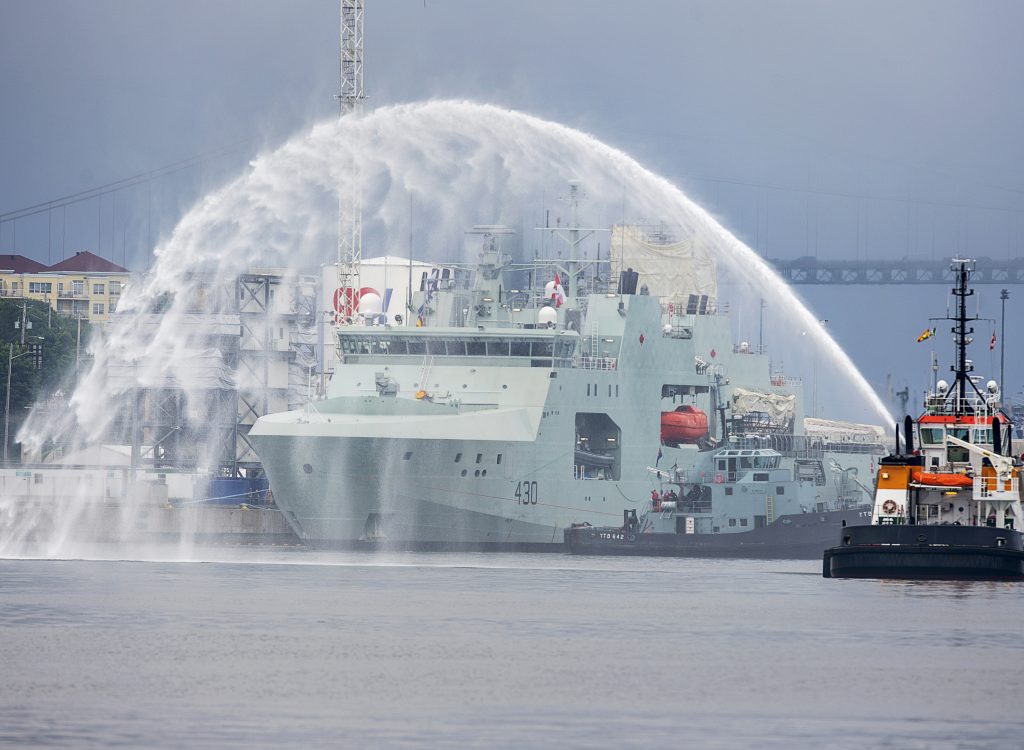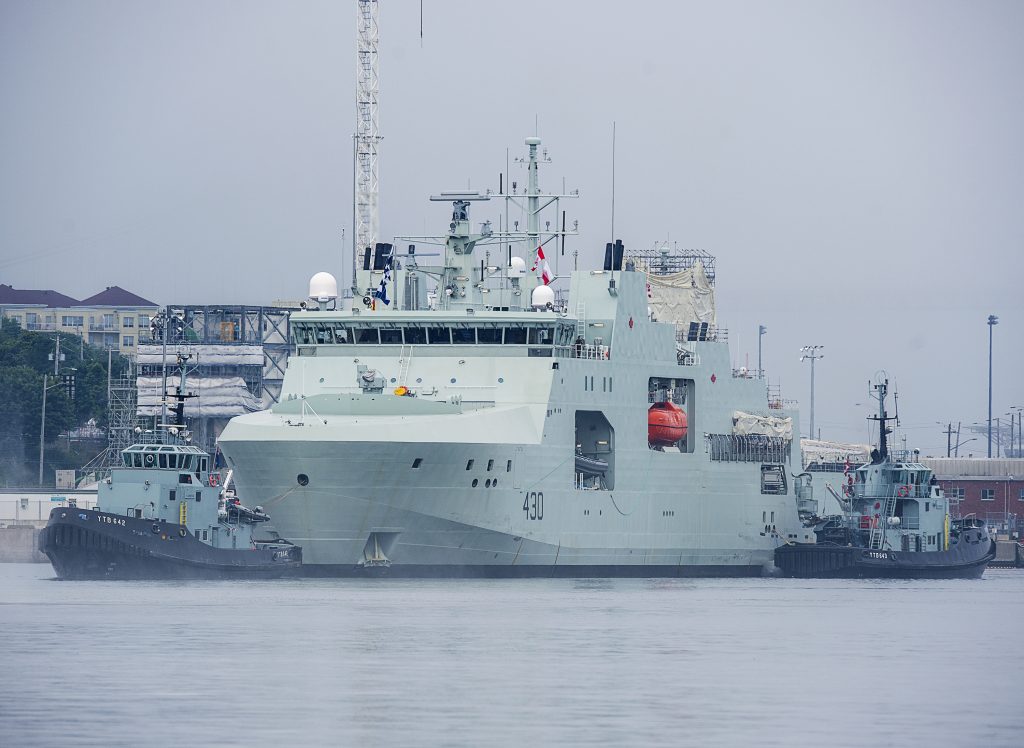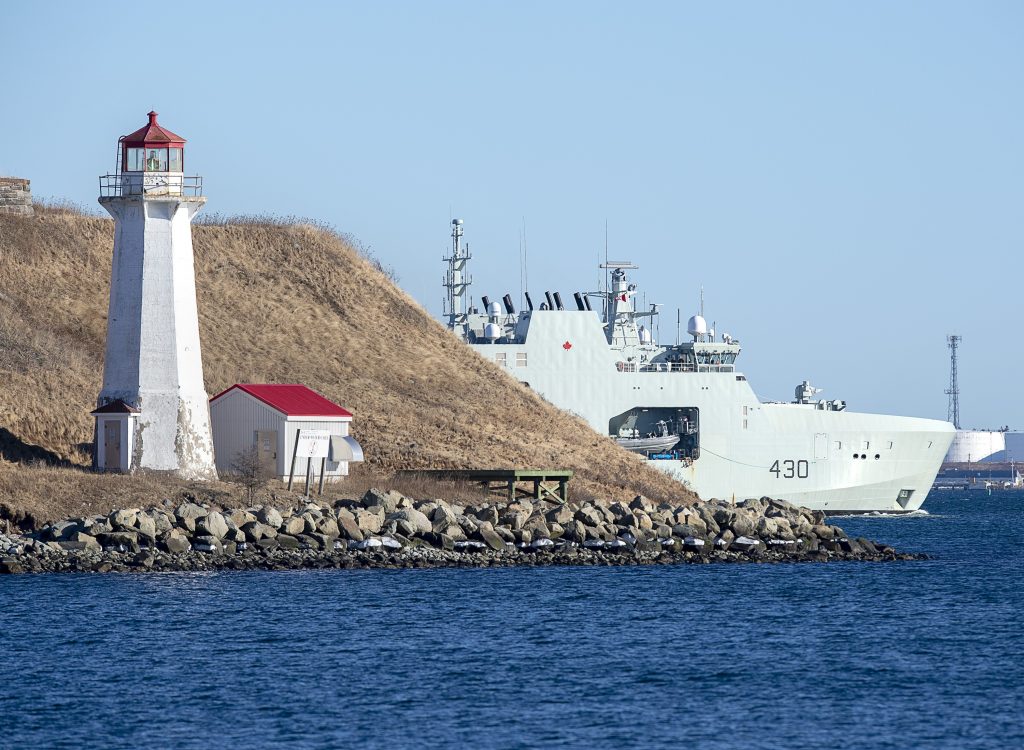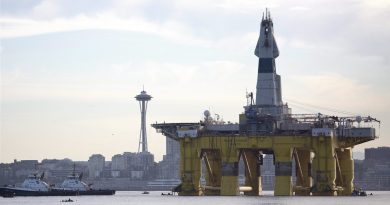Canadian navy receives its first new Arctic and offshore patrol ship

The Royal Canadian Navy officially received on Friday its new Arctic and Offshore Patrol Ship (AOPS), HMCS Harry DeWolf, first of a class of six ice-capable warships the military is expected to get to beef up its ability to protect Canada’s northern coastal waters.
Vice-Admiral Art McDonald, Commander of the Royal Canadian Navy, said the delivery of HMCS Harry DeWolf, named in honour of Vice-Admiral Harry DeWolf, a Canadian wartime naval hero, marks the beginning of an “exciting time for the RCN.”
In addition to operating in up to 120 cm of first-year sea ice, these new ice-capable warships will be able to accommodate a submarine-hunting Cyclone helicopter as well as small vehicles, deployable boats, and cargo containers.
Not an armed icebreaker

In terms of their offensive and ice capabilities, AOPS are a far cry from an armed icebreaker, but will at the same time have more maneuverability and flexibility, experts say.
“These ships will be at the core of an enhanced Canadian Arctic presence, effectively complementing the capabilities of our other current and future warships through critical reconnaissance and surveillance operations,” McDonald said in a statement.
The Harry DeWolf-class will also be capable of a myriad of different mission sets including humanitarian assistance and disaster relief, McDonald added.
Cost overruns and delays
Then-prime minister Stephen Harper first announced plans to build up to eight armed Arctic patrol vessels in July 2007 and Irving was selected in October 2011 to produce them before building replacements for the navy’s frigates and destroyers.
But the following years saw several cost overruns and delays in the program, which ballooned from $3.1 billion initially budgeted for the project to $4.1 billion for six warships.
Construction of the 103-metre, 6,615-tonne ship began at Halifax Shipyard in September 2015. It was launched on Sept. 15, 2018 and underwent sea trials in 2019.

HMCS Harry DeWolf will remain docked at Jetty NJ at the Canadian Forces Base (CFB) Halifax Dockyard while the navy conducts its post-acceptance trials and training, including operations near Newfoundland and Labrador, officials said.
Once this post-acceptance work is complete, the ship will undergo a formal commissioning ceremony in the summer of 2021, which will mark that it has officially entered into active naval service, followed by an Arctic deployment, they said.
Construction for the following three ships – HMCS Margaret Brooke, HMCS Max Bernays and HMCS William Hall – continues at Irving’s Halifax Shipyard, with construction of the fifth and sixth ships expected to begin in 2021 and 2022, respectively.
The Canadian Coast Guard will also get two civilian versions of AOPS, at about $400 million a piece.
The federal government is also working to complete the Nanisivik Naval Facility, on northern Baffin Island, in the Arctic territory of Nunavut. The former lead-zinc mine site, converted into a refueling facility for the Canadian navy, will support operations of the new AOPS and other government maritime vessels, officials said.
Initially slated for completion in 2015, this new facility is now expected to be completed in 2022.
Related stories from around the North
Canada: Canada’s long-term neglect of Arctic must stop says Senate report, Eye on the Arctic
Denmark: Pompeo to talk Arctic at upcoming meeting with Danish Foreign Minister, Eye on the Arctic
Finland: Finland joins other Nordic countries in virtual tourism due to pandemic, Yle News
Iceland: Nordics should aim for common approach to China’s Arctic involvement says report, Eye on the Arctic
Norway: Norway strengthens its Arctic military in new defense plan as security concerns grow in the region, The Independent Barents Observer
Russia: Two Chinese rigs prepare for drilling in Russian Arctic waters, The Independent Barents Observer
Sweden: Sweden’s FM calls for more EU involvement in Arctic as country hosts EU Arctic Forum, Radio Sweden
United States: Trump advances new icebreaker plan, Alaska Public Media



